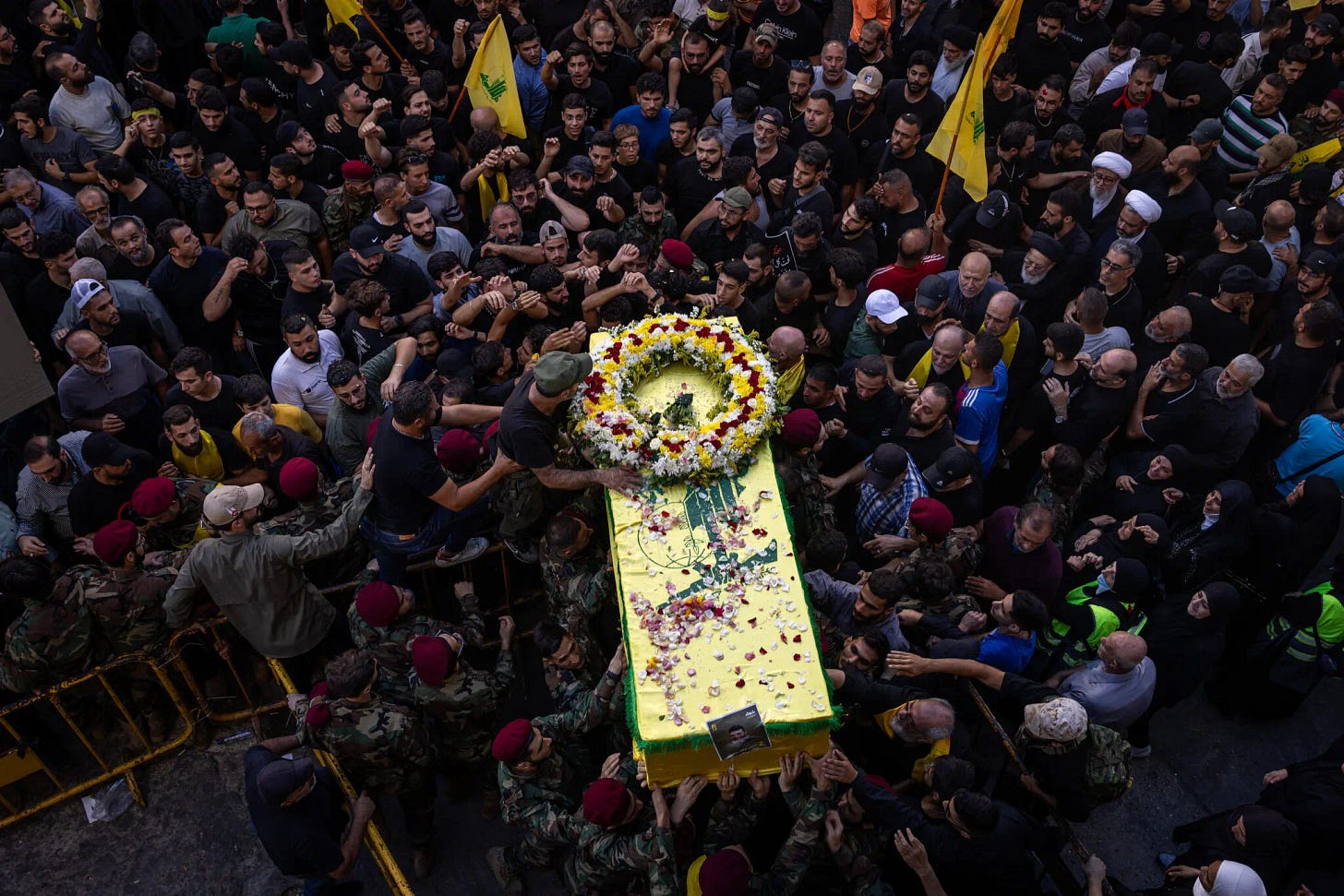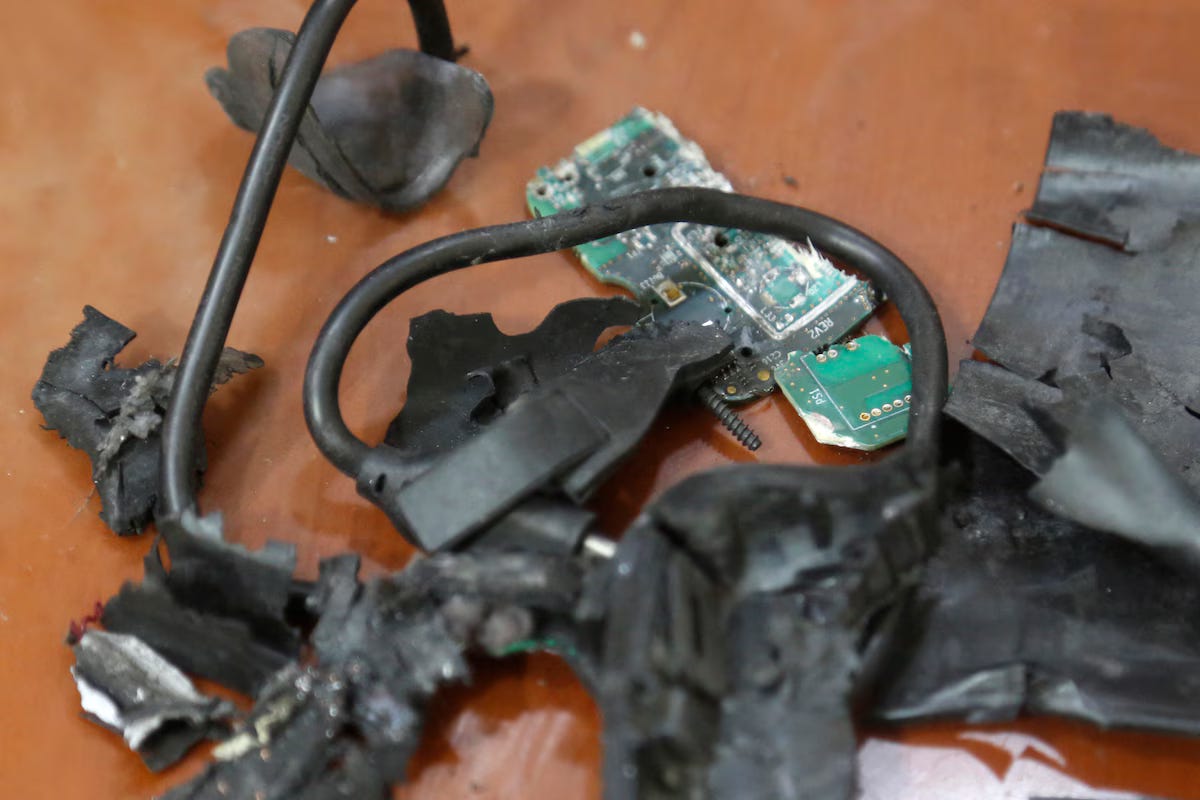Trojan Ponies in Disguise: How Israel Turned Innocuous Pagers Into Weapons Against Hezbollah
We dip into investigative pieces by 'The New York Times', 'The Washington Post', and other media outlets to craft a concise and insightful summary for our readers.

Israel's Silent Saboteurs: The Deadly Pagers that Crippled Hezbollah Cadres
Introduction
In the world of intelligence warfare, few nations have perfected the art of subversion quite like Israel. The recent explosions from rigged pagers in Lebanon, which killed over a dozen Hezbollah operatives and civilians, have revealed yet another audacious and almost unbelievable Israeli operation. Orchestrated by Israeli intelligence agencies, particularly Mossad, the plot highlights not only their tactical brilliance but also their far-reaching strategic foresight. This operation has drawn comparisons to some of the most intricate espionage schemes in history, offering a rare glimpse into the shadowy domain of covert operations, where precision and secrecy reign supreme.
The Exploding Pagers: A Deadly Surprise
What seemed like an ordinary Wednesday (September 16) in Lebanon turned into one of chaos and bloodshed when pagers carried by Hezbollah operatives began to explode, almost synchronously, without warning. The devices, which Hezbollah had believed to be a secure communication tool, were transformed into lethal weapons. The first wave of explosions killed at least 12 people and wounded over 2,700, many of them civilians. A second wave, involving walkie-talkies, killed an additional 25 people the following day. Children and bystanders were among the victims, marking the operation as one of the most complex and far-reaching in recent memory.
The operation is believed to have been in the making for years. Mossad, Israel’s external intelligence agency, along with other Israeli security services, used a web of front companies and suppliers across Europe and Asia to place rigged devices in Hezbollah’s hands. These devices were later activated remotely, delivering a devastating blow to Hezbollah’s infrastructure, especially its all-important foot-soldiers. According to Israeli intelligence sources, the objective was to cripple Hezbollah’s ability to communicate and organize. “It’s a severe hit on their command and control structure,” said Eyal Pinko, a former Israeli naval commander.
The “Red Button” Strategy: Lying in Wait
Central to the operation was Israel’s concept of the “red button”—a metaphor for a pre-emptive strike capability that can be triggered at will. The rigged pagers had been distributed to Hezbollah operatives for nearly two years, lying dormant until Israeli intelligence decided the time was right. The explosion, triggered at a moment of Israel’s choosing, highlights the degree of control Israeli intelligence maintains over its adversaries.
This operation forms part of a broader strategy of maintaining technological superiority in a region fraught with asymmetric warfare. A former Israeli intelligence official remarked, “The detonation of the pagers wasn’t part of the original comprehensive plan, but it had a substantial impact when needed.” The sudden activation of these devices crippled Hezbollah’s communications and left their leadership scrambling to pick up the pieces. The psychological damage and the enduring paranoia it has triggered are, of course, immeasurable.
Exploiting Hezbollah’s Shift to Low-Tech Solutions
Hezbollah’s reliance on pagers can be traced to their leader, Hassan Nasrallah, who publicly condemned mobile phones as tools of Israeli espionage. In a 2020 speech, Nasrallah had warned his operatives to avoid mobile phones, saying they were being used to pinpoint Hezbollah members' locations for Israeli strikes. In response, Hezbollah shifted to pagers, which they believed were more secure from Israeli surveillance and hacking.
However, this move played directly into Israeli hands. As Hezbollah switched to pagers, Israel had already anticipated the shift and set up a sophisticated operation to intercept their supply chain. Using European shell companies, including a Hungarian entity called B.A.C. Consulting, Israeli intelligence provided Hezbollah with pagers designed to explode on command. “It was like planting a Trojan horse—only far deadlier— inside Hezbollah’s most trusted communication tools,” said one intelligence official familiar with the operation.

A Complex Web of Deception
What made the operation particularly effective was the layered deception involved. Israeli intelligence used front companies to manufacture and distribute the explosive-laden pagers, concealing their origins. European suppliers and shell companies, with no apparent connection to Israel, played a key role in the operation. From Taiwan to Hungary, a vast network of entities were exploited to ensure that Hezbollah received the rigged devices without suspicion.
One official described the process: “You create an infrastructure of companies, one selling to another, hiding the true nature of the product until it reaches its final destination.” This level of deception made it nearly impossible for Hezbollah to trace the devices back to Israel, until it was too late.
Moral and Ethical Dilemmas
While the operation demonstrated Israel’s strategic and technological prowess, it also raised significant moral and ethical questions. The indiscriminate nature of the explosions, which killed not only Hezbollah operatives but also civilians, including children, has sparked debate. Some critics argue that the mission, though tactically successful, may not achieve Israel’s broader strategic aims and could escalate tensions in an already volatile region.
A former U.S. intelligence official was quoted saying, “Had the U.S. known about the scope of the operation, we would have tried to stop it, given the risk of civilian casualties.” On the other hand, Israeli officials maintain that the operation targeted Hezbollah’s leadership and infrastructure as precisely as possible, arguing that any collateral damage was unfortunate but unavoidable in such complex missions.
A Legacy of Covert Operations
This operation is reminiscent of past Israeli intelligence missions, such as the Stuxnet cyberattack on Iran’s nuclear program and the targeted assassinations of Hezbollah commanders, the latest one in Tehran. Israel’s intelligence services have consistently sought to maintain the upper hand in an environment where conventional warfare is often replaced by shadowy, covert operations. The exploding pagers serve as a reminder of Israel’s willingness to take pre-emptive action when it perceives a threat to its national security.
Experts have compared the pager plot to historical espionage cases, such as the post-World War II operation in which the U.S. and German intelligence gained control of a Swiss company, Crypto AG, which sold rigged encryption devices to foreign governments. As in that case, the Israeli operation relied on penetrating supply chains and manipulating seemingly benign technology to achieve devastating effects.
Summing Up: The Quest for Security and Stability
The exploding pagers operation is a testament to Israel’s proactivity and technical sophistication in combating its enemies. By leveraging cutting-edge intelligence tactics, Israel has once again demonstrated its ability to deliver precision strikes without resorting to large-scale military invasions. However, the collateral damage and loss of civilian lives also underscore the inherent risks in such operations.
In the grand scheme of things, while these tactical victories may weaken Hezbollah in the short term, they do little to address the long-term instability in the region. For peace to prevail, it is crucial that all parties seek a balance between security and diplomacy. Ultimately, no amount of tactical success can substitute for the kind of stability that comes from dialogue and lasting peace. The hope remains that both Israel and Hezbollah, and their respective allies, might eventually move from the battlefield to the negotiating table.




ਸਿੱਧੂ ਸਾਹਿਬ
ਇੱਕ ਤਾਂ ਵਿਗਿਆਨ ਨੇ ਵਿਕਾਸ ਦੇ ਨਾਮ ਤੇ ਵਿਨਾਸ਼ ਦਾ ਸਮਾਨ ਇਕੱਠਾ ਕਰ ਰੱਖਿਆ ਹੈ ਤੇ ਦੂਜਾ ਮਨੁੱਖੀ ਸੁਭਾਅ ਵਿੱਚ ਵੀ ਮਾਨੋਂ ਕਿ ਬਾਰੂਦ ਭਰਿਆ ਹੋਇਆ ਹੈ। ਸੰਸਾਰ ਦੇ ਸੁਭਾਅ ਅਤੇ ਜੰਗੀ ਸਾਮਾਨ ਇਕੱਠਾ ਕਰਨ ਕਰਕੇ ਹੁਣ ਸੰਸਾਰ ਦੀ ਤਬਾਹੀ ਨਿਸ਼ਚਿਤ ਹੈ।